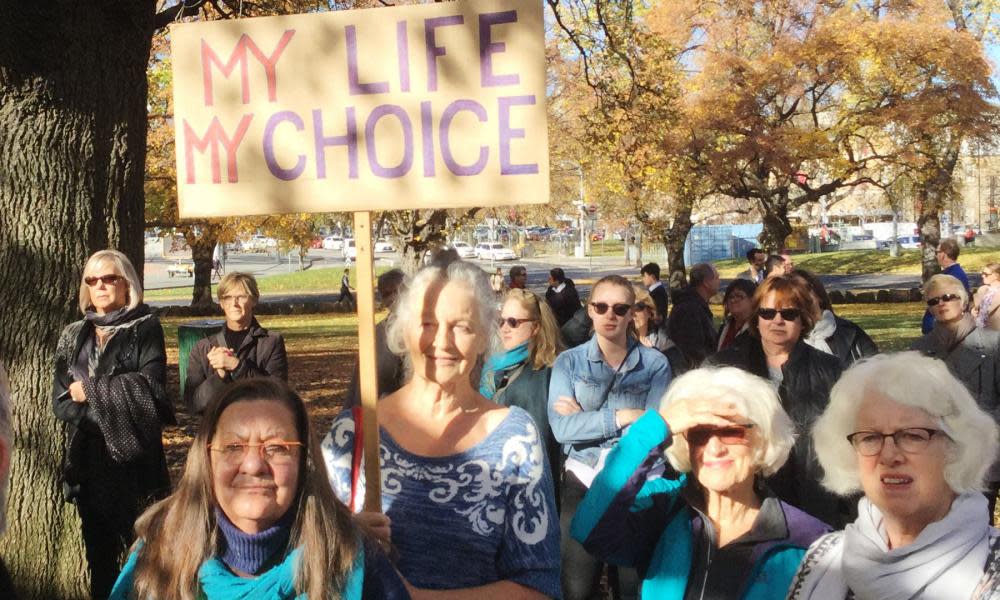What are the laws on voluntary assisted dying in each state?

Voluntary assisted dying has been legalised in all states across Australia, with legislation in New South Wales coming into effect from the end of November this year. It is not yet legal in the Northern Territory or the Australian Capital Territory. But last December, commonwealth laws that stopped the territories from making new laws on voluntary assisted dying were repealed, which opens a pathway to potential future legalisation.
How do the laws differ across Australia?
Who is eligible for voluntary assisted dying?
In states where VAD is legalised, individuals must be Australian citizens or permanent residents aged 18 or over. They must be acting voluntarily, have decision-making capacity and have a terminal medical illness likely to cause death within six months, or 12 months in the case of neurodegenerative conditions. Queensland’s rules differ: the person applying needs to have a condition likely to cause death within a year. The medical condition must also cause suffering that cannot be relieved tolerably.
Generally, patients must make at least three requests for access to VAD, and be assessed at least twice by medical professionals.
There are two methods of accessing euthanasia: self-administration, where a person takes the VAD medication themselves, and practitioner administration. Both methods are available across Australia but certain states have specific requirements. For example, in Victoria and South Australia, practitioner administration is only available if the patient cannot physically self-administer or digest the medication.
What legal obligations do health professionals have?
In Victoria and South Australia, health practitioners cannot initiate VAD conversations. In Western Australia, Tasmania, Queensland and NSW, medical practitioners can bring up VAD, but must also discuss treatment and palliative care options at the same time.
Ben White, a professor of end-of-life law at Queensland University of Technology, says the laws in Victoria and SA are a problem. “Family members and patients have described not being able to find the right words, not being able to generate the right conversation,” he says. “There’s an issue of health literacy in a voluntary assisted dying setting. How can you access VAD if you don’t know it exists and doctors don’t tell you about it?”
Health practitioners can conscientiously object to providing euthanasia. “In three states – Queensland, WA and Tasmania – there’s a requirement of either provision of information or contact details, or referral,” White says. In other states, such as Victoria, a person with conscientious objection to euthanasia can refuse to provide patients with any information about it.
Three states – Queensland, South Australia and NSW – include institutional objection provisions in their legislation. In those states, people are generally able to access voluntary assisted dying if they are permanent residents of an aged care or palliative care facility, even if the facility objects.
“It would be optimal to have national laws, but I think that has proved extremely challenging … including the related field of advanced care planning and advanced care directives,” White says.
Voluntary assisted dying status, state-by-state
Victoria
Legalised in 2017, laws came into effect on 19 June 2019.
Person must have an incurable illness.
Health professionals cannot bring up VAD as an option; the patient must initiate a VAD conversation.
Patients must take the medication themselves unless they cannot self-administer or digest it, in which case a practitioner can administer it.
NSW
Legalised in May 2022, the legislation will come into effect on 28 November 2023.
Patients can choose whether they want to take the medication themselves orally or for it to be injected by a doctor.
Includes institutional objection provisions in the legislation: individuals living permanently in aged care, palliative care or other facilities are usually able to access VAD services even if the facility objects, because it is considered the person’s home.
Queensland
Legalised in 2021, laws came into effect on 1 January 2023.
Unlike other states, which require a medical condition likely to cause death within six months, the person applying needs to have a condition likely to cause death within a year.
Includes institutional objection provisions in the legislation: individuals living permanently in aged care, palliative care or other facilities are usually able to access VAD services even if the facility objects, because it is considered the person’s home.
Conscientious objectors must provide contact details of a service that provides VAD.
South Australia
Legalised in 2021, laws came into effect on 31 January 2023.
Person must have an incurable illness.
Health professionals cannot bring up VAD as an option; the patient must initiate a VAD conversation.
Includes institutional objection provisions in the legislation: individuals living permanently in aged care, palliative care or other facilities are usually able to access VAD services even if the facility objects, because it is considered the person’s home.
Patients must take the medication themselves unless they cannot self-administer or digest it, in which case a practitioner can administer it.
Western Australia
Legalised in 2019, laws came into effect on 1 July 2021.
Conscientious objectors must provide contact details of a service that provides VAD.
Tasmania
Legalised in 2021, laws came into effect on 23 October 2022.
Person must have an incurable and irreversible illness.
Conscientious objectors must provide contact details of a service that provides VAD.
ACT
Not legal. A person who assists another individual to die may be charged with murder, manslaughter or assisting suicide. In December 2022, commonwealth laws that stopped Australian territories from making new laws on voluntary assisted dying were repealed.
Northern Territory
Not legal. A person who assists another individual to die may be charged with murder, manslaughter or assisting suicide. Euthanasia was previously legal in the NT in 1996-97, until the territory law was nullified by the federal government. In December 2022, commonwealth laws that stopped Australian territories from making new laws on voluntary assisted dying were repealed.

 Yahoo News
Yahoo News 
